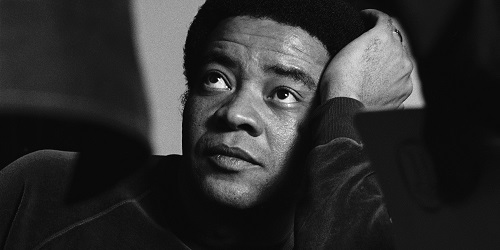By Ira Kantor
If there’s one thing I’ve learned from Bill Withers, it’s that you could have soul beyond just your music.
Where other acts of his era banked their talents on look, style, and harmony, Withers made his legacy (fortune was always secondary) by presenting himself to the masses as an everyman. This was not an artist to be pigeonholed to R&B but rather one who could affect any listener with his introspection.
He was an anomaly in popular music but in the greatest sense of the word. Growing up in Slab Fork, West Virginia, Withers transformed his humble roots into honest living. Writing songs and plucking a guitar would become part of the equation – yet later on. Had he not hit the charts from the word go, Withers would have been just as happy building toilets for 747 aircraft — which he actually did for years. Just watch him in the underrated documentary “Still Bill.” He’s not wearing flashy suits or jewelry; in fact, he’s performing live most times in T-shirts, sweatpants and sneakers — the look of a comfortable man: comfortable in his skin and comfortable with his life choices, including walking away from music for more than 30 years.
Breaking into a difficult business is obviously not easy. But in this regard, Withers was in a class all his own. He wouldn’t enter public consciousness until he was 32 years old. Now imagine an artist trying that now, taking into account industry dynamics and processes. It’s all but impossible. Yet even when fame followed him everywhere, Withers never compromised his sound or style – keeping things simple and direct. He chose a smaller record label, Sussex, to make his way. His most popular songs weren’t overproduced and didn’t last for eons. They don’t even have sustained musical breaks; they just come straight from the heart. Album titles like Just As I Am and Still Bill relay Withers’ overall accessibility to every make of human being.
And then there’s that rich baritone voice of his. It’s a voice of comfort and amiability. No matter the song he’s singing, he sounds like he’s singing right to you and right for you, trying to get to the crux of what affects you. Despite releasing nine albums in a 15-year career, Withers’ composition power is really cemented by six songs. May not seem like much but when they’ve been used as a template for what works time and time again over the years (i.e. Club Nouveau, Blackstreet’s “No Diggity”), the quality dominates over the quantity.
As listeners, we’ve felt Withers’ pain on “Ain’t No Sunshine” (“I know, I know, I know…”); his love on “Grandma’s Hands” (“Mmm-hmmm”); his hurt on “Use Me” (“Now baby, baby, baby!!!”); his joy on “Lovely Day” (backed by one of the greatest sustained notes in history); and his tenderness and sensuality on “Just The Two Of Us.” Withers’ biggest hit, “Lean on Me,” is gospel at its finest as his vocals and lyrics implore us to share our burdens with one another and mutually lift each other up in times of turmoil. Every church, synagogue, mosque and other place of worship should use this song as a 101 primer for their congregations.
Even if he never sustained repeated gold records or music superstardom, Withers’ collective work remained just as ear pleasing, right up until his last studio album — 1985’s Watching You Watching Me (my favorite of his). If you get the chance, watch Withers in the music video for “Oh Yeah!.” It’s slightly campy and while Withers resembles Al Jarreau with facial hair, he looks like he always does – like someone we could have a drink with; could share a hug with; and could become best friends with after one meeting.
Part of this accessibility lies in Withers being unafraid to be influenced by others. Watch a particularly moving scene in “Still Bill” where he meets a group of kids with stutters, which Withers himself has dealt with his whole life. Watch the tears fall out of his eyes when he sees their resilience. Then watch him at his Rock and Roll Hall of Fame induction — he doesn’t allow his star power to topple that of Stevie Wonder’s and John Legend’s; instead he lets them sing his words as he watches awestruck.
There’s no ego, no pretense. That’s the epitome of what a man should be.
And even with the multiple Grammys and Hall of Fame inductions, Bill Withers will always be a one-of-a-kind artist, and a one-of-a-kind man. And he will be deeply missed, especially as now, more than ever, his music contains the power needed to make the world all right with us again.





















